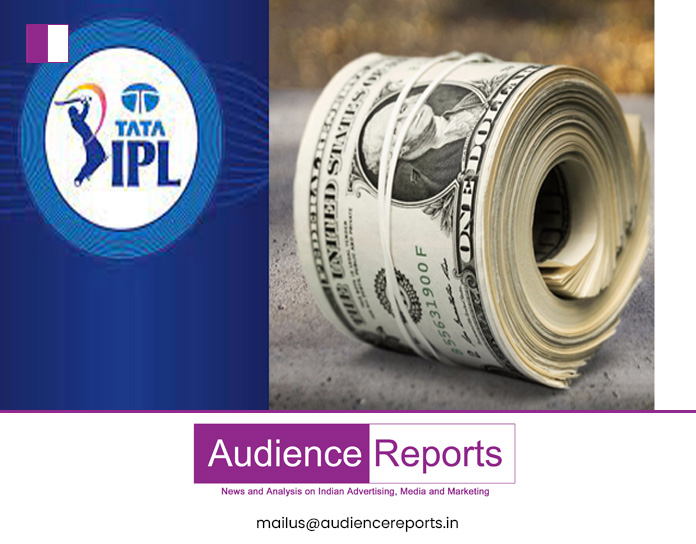Creative agencies earn additional revenue during IPL by taking on project-based work and content-creation jobs, in addition to serving their retainer clients.
With brands spending close to Rs 5,000 crore this IPL season, creative agencies are witnessing an uptick of 20-30% in revenue during the cricket frenzy.

Abhik Santara, Founder, Atom Network, said, “Work created around IPL typically adds around 25-30% to the overall revenue growth, which depends on many other factors too. The same campaign is used on other occasions also, but yes, IPL takes centre stage on most campaign launches for brands with deep pockets.”

Amit Wadhwa, CEO, dentsu Creative India, added, “During IPL, other than retainers, we also get a lot of project basis work. We also get a lot of content work for which we are paid separately. The opportunities for more remuneration increase during IPL.”
During the IPL period, creative agencies are not just busy doing work for retainer clients but they also fetch a lot of project-based work and other content creation jobs. Amit Wadhwa
A renowned business head from a network creative agency opined that even when IPL is a lucrative property for creative agencies to add-on to their revenue, the percentage of revenue added by IPL has become stagnant over time and he doesn’t see it growing exponentially in the next few years.
“In the first few years of IPL, the revenue uptick at creative agencies was much higher as there were huge expectations and novelty value. After a while, it became a little more stable, which is 20%. My assumption is that it will not increase considerably in the coming years. While the property is exciting, the ad agencies’ earning from it depends on the overall conditions for brands to spend in India,” the business head said.

Chirag Bhatia, Senior Vice-President – Digital, DDB Mudra Group, stated that usually, IPL ad dollars would grow about 25-30% YoY, but this year in particular the IPL ad revenue is projected to touch approximately $550 million, which is almost flat of last year despite the IPL cumulative reach projected to reach newer heights to 600-700 million.
“The ad revenues won’t grow in line with audience growth because the consumer internet start-ups are being a little more cautious than before because of the so-called funding winter and other macro factors weakening the global economic sentiment. Macroeconomic factors like surging interest rates across economies, the escalating banking crisis in the US and Europe, the country’s GDP growth, consumer spending patterns, inflation rates and other uncertainties linked to the ongoing war, also have a role to play,” he said.
Bhatia said, “IPL is work time for agencies – whether it is creative, social or media agencies etc. A good chunk of agency revenues is projected for this time of the year as there is so much happening.”

As per Sanjeev Jasani, COO, Cheil India, the mutually beneficial relationship between the marketing industry, their agencies, and the IPL has flourished, with digital marketing benefiting the most due to the three-hour format, match-slotting hours, the emotional investment of fans, and commercial sponsorships.

Personifying IPL as a big box of chocolates for advertisers and ad agencies, Krishna Iyer, Director of Marketing – MullenLowe Lintas Group, said that one never knows what to expect, but has a surety for it to be sweet. “With all the opportunities available to brands, they can sponsor everything from players to umpires to cheerleaders. Who knows, we might even see a brand sponsor for the restroom rolls in the stadium loos,” he commented.
While people say that IPL and especially cricket is like a festival in India, it is still time for the property to come at par with the actual festive period of the year. “During the festive season, agencies witness a growth of 40-45% in revenue. On the other hand, IPL adds 20-25% of incremental revenue,” said a business head at India’s one of the biggest creative agencies.
It is not just brands that buy ad spots, sponsorships of teams, but also the brands which just bank on the popularity of the league. Therefore, there is plenty of business for agencies across the board.
Wadhwa said, “Everyone wants to encash the property. There would be brands who would just advertise in the context of cricket or cities: Bangalore vs Delhi vs Mumbai. One of the biggest examples is the erstwhile Pepsi campaign ‘Nothing official about it’, where they were not the sponsors of the World Cup, but used it to their advantage and became bigger than the official sponsors.”

Ashish Khazanchi, Managing Partner, Enormous Brands, commented, “While IPL is fast turning out to be a very busy period for agencies, the festive season still holds sway for most marketers as the incidence of purchase is much higher around the festivals.”
He further said, “IPL builds salience, reach and impact for most brands, given that the event becomes the highest audience aggregator of the year, the advertising around the festivals is still a tad higher because of e-commerce, white and brown goods, automobiles, jewellery, etc. About half of the year’s sales happen in a concentrated period of about a month.”
According to Bhatia, from an advertising perspective, there are only two festivals in the country: Diwali and IPL. “There isn’t a property which could come even closer to IPL in terms of reach and that’s precisely the reason brands won’t let this once-in-a-year opportunity go to waste. On the other hand, Diwali is when consumerism is at its peak. So, it’s imperative for brands to create that fresh recall. Hence, the core objectives for a brand to be seen during these times differ slightly.”
Stating other reasons why Diwali ad revenue would anytime be more than IPL for creative agencies, Bhatia said. “There is a certain minimum threshold for a brand to be adequately seen during IPL hence everyone can’t afford to be present on IPL properties. During Diwali, everyone has his own sweet budget and it’s possible to create a buzz of that magnitude. While during IPL brands do peripheral activities not on the core broadcast platforms with lesser budgets but to really juice returns at scale one needs to associate with the official broadcast partners like Jio or Star. This isn’t the case for Diwali, hence the long tail gets activated at every level which spins the overall ad volumes with the average per advertiser ticket size being lesser than IPL. Also, cricket historically being perceived as a man’s game is now changing but that perception limits the activation of brands targeting female TG during IPL. This is debatable but is a general perception.”
Although Iyer believes that just like the festive period IPL too has a massive impact on consumption since people tend to indulge in various activities during the tournament, such as watching matches, attending live events, purchasing merchandise, etc.
He further said, “Even though funding winter has set in, and investors are demanding unprecedented growth, IPL is the preferred choice of young enterprise brands looking for a steroid-like treatment to scale up visibility. Remember, start-ups like Dream 11, Swiggy, Cred, Paytm, etc. have not only been built on the back of this cricketing festival but have also leveraged this significant opportunity to tap into sales run chase through their marketing promotions.”
Santara suggested that IPL overshadows the festive period when it comes to appealing to the audience at a mass scale. He said that IPL has the power to captivate the audience at large, across many segments. “During festivals, media choices are fragmented, regional and so is the audience targeting. IPL works out to be more efficient for a mass market and national brand.”
IPL is the time when brands create a memorable impact on consumers’ minds. Therefore, it is highly important for brands and agencies to focus on the creativity and storytelling in campaigns created during the period rather than focusing more on a data-led approach, as per him.
One doesn’t really know if ever IPL ads will overshadow the festive period in terms of revenue addition, but IPL is definitely a very busy period for creative agencies.
Santara said, “Over the years, the format of ads has changed – from running a spot during the season to bringing the contextuality of cricket in communication, many of our campaigns have seen all kinds of iterations. IPL does take a noteworthy piece of our time – from making classical ad spots to preparing numerous other assets in TV, digital and on-ground – the repertoire has been vast.”
Cheil’s Jasani said, “IPL has been an ultimate entertainment destination in India since its inception in 2008. With the tournament, viewers also eagerly look forward to the campaigns curated for the season. From Bollywood-style Manoranjan ka Baap to Farah Khan’s Jumping Japang, IPL campaigns have redefined sports advertising in the country. However, the campaigns have shifted from being creativity-driven to data-driven, resulting in a loss of quirkiness and memorability.” He went on to add, “Personally, I’m a digital guy and believe a lot in data-driven marketing, but I strongly feel the data-driven approach should be used for targeting rather than creativity. We should speak the language of the fan and let creativity run wild so as not to lose the memorability and entertainment factor. IPL remains one of the few opportunities to experiment with creativity, storytelling, and other creative aspects. Why lose it?”





































